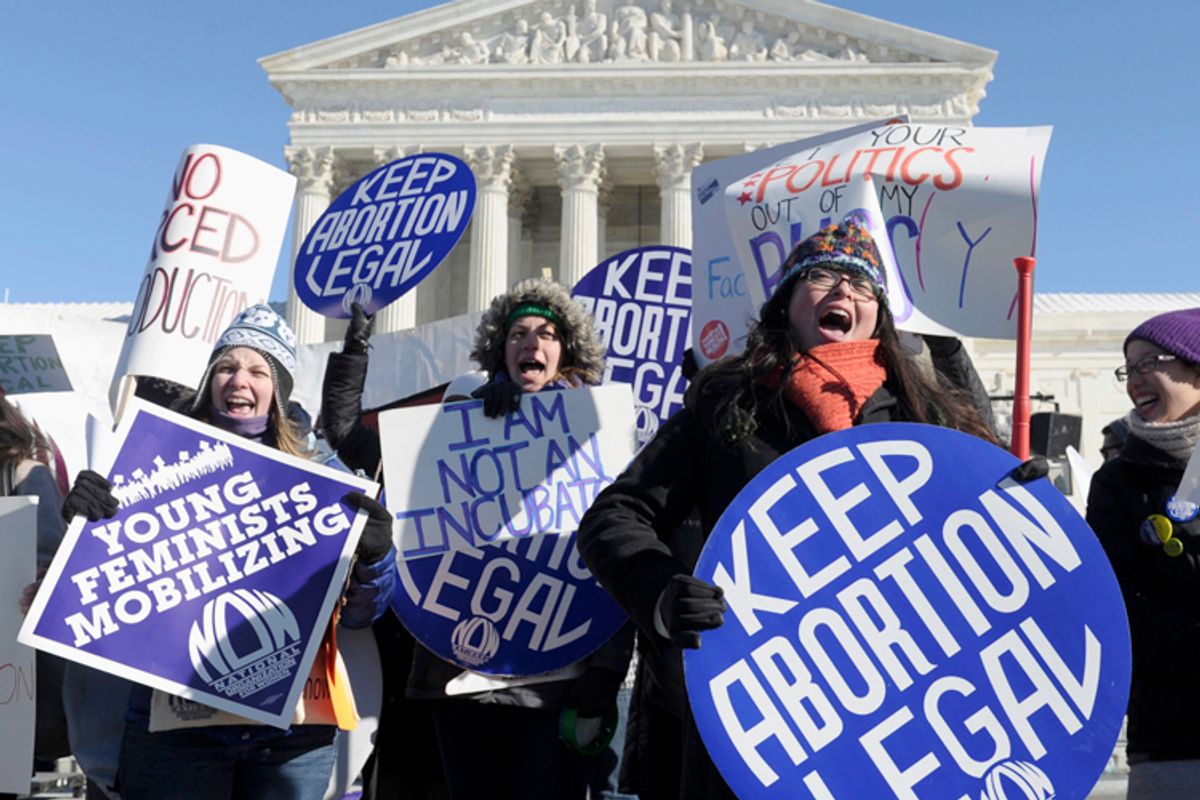In the last week, two courts have struck down two separate abortion laws after finding that they placed an undue burden on pregnant people trying to exercise their constitutional rights and access basic medical care. In Mississippi, an admitting privileges law that would have shut down the state's last remaining clinic was overturned, with the court concluding that Mississippi couldn't "shift its obligation to respect the established constitutional rights of its citizens" to neighboring states. In Alabama, an identical requirement was struck down, with a federal judge finding that the law served no medical purpose and only hinders access to care. According to the decision, a "significant number of the women would be prevented from obtaining an abortion; others would be delayed in obtaining abortions, exposing them to greater risks of complications; and even the women who are able to obtain abortions would suffer significant harms in terms of time, financial cost, and invasion of privacy."
This kind of engagement with reality is refreshing as an alarming number of courts, including the Supreme Court, seem to have accepted antiabortion and anti-contraception pseudoscience and talking points as fact. The question now is whether or not the federal court hearing a challenge to provisions of Texas' sweeping antiabortion law will have the same degree of interest in the real world.
It's hard to imagine how the court could ignore the startling consequences of HB 2. As Andrea Grimes at RH Reality Check reported Tuesday, abortion providers in the state testified about the challenges they've faced trying to comply with the requirements that their clinics meet the standards of an ambulatory surgical center and that their providers have admitting privileges at nearby hospitals.
Amy Hagstrom Miller, the founder and CEO of Whole Woman’s Health, has already closed three of her five clinics in the wake of the new law, and the ambulatory surgical center requirement -- set to go into effect next month -- threatens to shutter her remaining clinics. Like providers in Mississippi and Alabama, Hagstrom Miller has tried to comply with the new requirement, but hasn't been able to find the financial backing to make the necessary modifications:
One barrier, said Hagstrom Miller, was obtaining financing to operate million-dollar facilities that could be shut down in the next legislative session if state lawmakers pass more legislation like HB 2.
“People felt like an investment in Texas was very risky,” said Hagstrom Miller. She said that potential investors asked her, “‘How do you know another law won’t pass that will prevent you from being able to provide abortions at ASC’s?’”
She's also faced barriers while trying to obtain admitting privileges, in part because she couldn't find physicians to sponsor her providers' applications because some were scared of violent retribution. “Some physicians worried about safety and worried they would attract attention even by co-signing,” Hagstrom Miller explained.
And while Hagstrom Miller is working hard to comply with the new requirements, there still remains zero evidence that the admitting privileges law or the new surgical center standards have any bearing on the safety of an already remarkably safe procedure.
According to research from the Texas Policy Evaluation Project, there were 41 abortion providers in the state in 2013. That number fell to 19 after HB 2 went into partial effect. As a result, the number of women of reproductive age living more than 200 miles from a provider has increased by nearly 3,000 percent — from 10,000 women in 2013 to 290,000 in 2014. If and when the ambulatory surgical center requirements kick in, that number is expected to balloon to nearly 800,000.
These are the factors -- the barriers providers faced in trying to comply with the laws, the violent political climate, the cost, travel and geographical burdens faced by people trying to access care -- that the courts found compelling in overturning the Alabama and Mississippi laws. The stakes are identical in Texas -- let's hope the outcome of the legal challenge is, too.

Shares